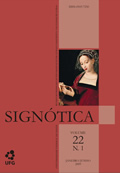The nietzschean irony and its influence in contemporary literature
DOI:
https://doi.org/10.5216/sig.v22i1.12700Abstract
This essay analyzes the irony in Nietzsche, taking into account threemoments. First, succinctly construct the concept of irony developed byFriedrich Schlegel, who defines irony as awareness of the chaos of theuniverse, which takes the form of a paradox. Second, we examine the irony inNietzsche’s Thus Spoke Zarathustra which proposes an aesthetics of thoughtthrough narration to highlight the unambiguous loss of reality. Third, we studyits influence on contemporary literature as a way of releasing the thought ofultimate purpose.Downloads
Download data is not yet available.
Downloads
Published
2010-12-16
How to Cite
GARAY, Elizabeth Sánchez. The nietzschean irony and its influence in contemporary literature. Signótica, Goiânia, v. 22, n. 1, p. 39–56, 2010. DOI: 10.5216/sig.v22i1.12700. Disponível em: https://revistas.ufg.br/sig/article/view/12700. Acesso em: 2 mar. 2026.
Issue
Section
Article
License
Author (s) authorize Signótica to publish an article, if accepted, signing its contribution as original and not submitted to another publisher for publication. In case of acceptance and publication, Signótica's articles are Creative Comons BY-NC-ND (Attribution + Non-Commercial + Non-Derivatives)





1.png)





